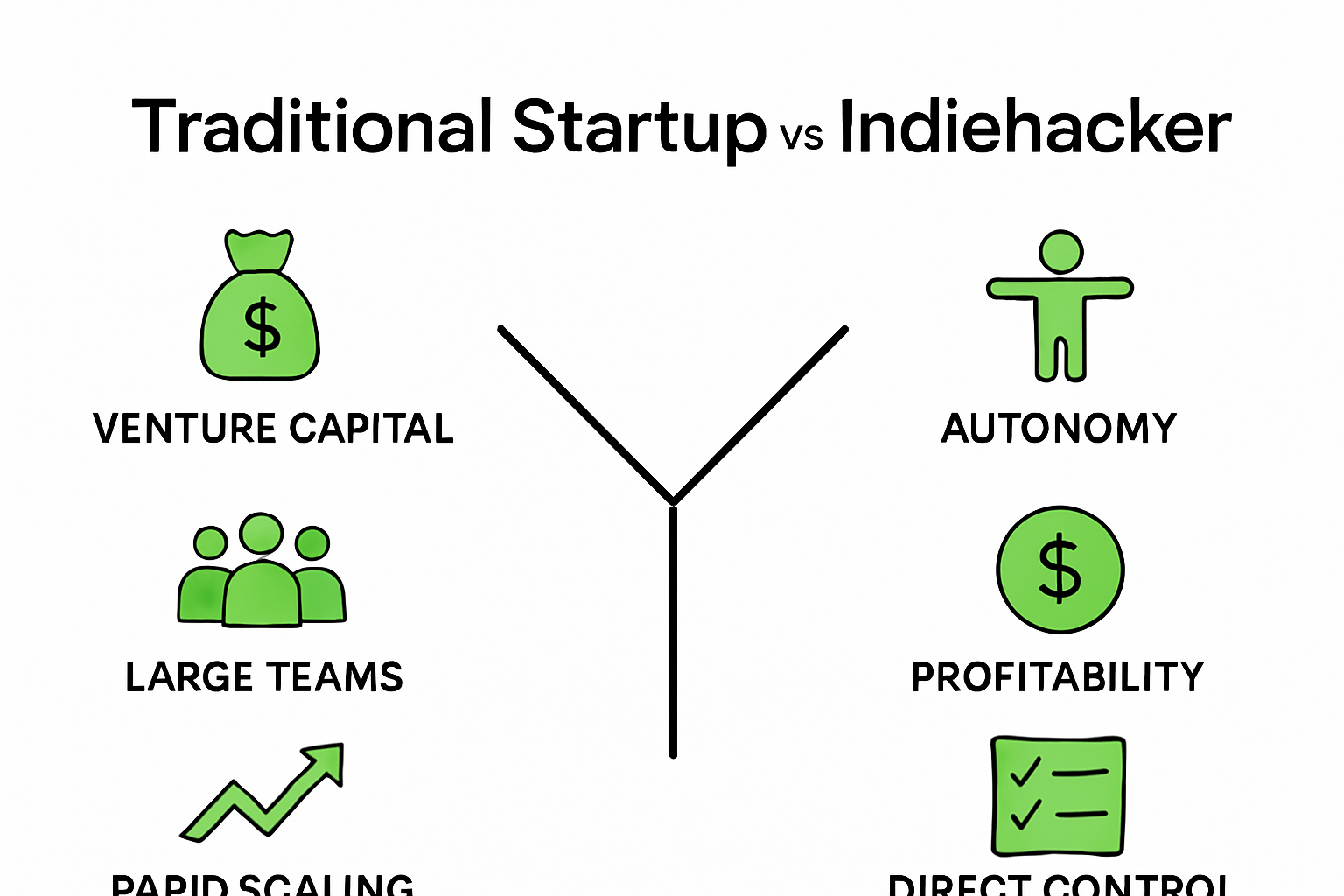
Understanding Indiehackers: Who They Are and Why It Matters
The indie hacker movement is changing how people think about entrepreneurship. More individuals than ever are building profitable digital businesses all by themselves, and research shows that independent solo founders now account for a rapidly growing share of new startups. That sounds impressive, but the biggest surprise is not the spike in numbers or tech advancements. It is that these solo creators are thriving with minimal funding, proving you do not need investors or big teams to succeed online.
Table of Contents
- What Is An Indiehacker? Defining The Concept
- The Core Definition
- The Technological Ecosystem
- Why Indiehackers Are Important In Today’s Economy
- Economic Flexibility And Resilience
- Technological Democratization
- How The Indiehacker Model Works: Key Components
- Revenue Generation Strategies
- Technological Infrastructure And Tools
- Personal Branding And Community Engagement
- Common Challenges Faced By Indiehackers And Solutions
- Financial And Resource Constraints
- Technical Debt And Skill Limitations
- Market Validation And Competitive Differentiation
- Real-World Examples Of Successful Indiehackers
- Digital Product Success Stories
- Bootstrapped Software And SaaS Triumphs
- Community And Content-Driven Success
Quick Summary
What is an Indiehacker? Defining the Concept
The world of entrepreneurship has been dramatically transformed by a new breed of digital creators known as indie hackers. These innovative individuals represent a fundamental shift in how modern businesses are conceptualized, built, and scaled in the digital age.
The Core Definition
An indie hacker is an independent entrepreneur who builds and launches digital products or services with minimal external investment, focusing on creating sustainable, profitable businesses through personal skill, creativity, and technological leverage. Unlike traditional startup founders who often seek substantial venture capital and rapid growth, indie hackers prioritize autonomy, profitability, and direct control over their entrepreneurial journey.
To help clarify the key differences between indie hackers and traditional startup founders, the table below compares their core characteristics, motivations, and operating models.

According to independent entrepreneurship research, indie hackers typically share several defining characteristics:
- They work independently or with extremely small teams
- They leverage digital platforms and technologies to create scalable products
- They aim for sustainable revenue rather than massive, rapid expansion
- They maintain complete ownership of their business
The Technological Ecosystem
The rise of indie hackers has been enabled by transformative technological trends. Cloud computing, no-code platforms, affordable development tools, and global digital marketplaces have dramatically lowered barriers to entry for solo entrepreneurs. These technological shifts mean that a single individual can now develop, market, and monetize a digital product with minimal upfront investment.
Indie hackers often emerge from diverse backgrounds technical software developers, designers, writers, and passionate problem solvers who recognize opportunities to create value through innovative digital solutions. Their approach represents a fundamental reimagining of entrepreneurship one that prioritizes personal freedom, direct value creation, and sustainable growth over traditional corporate scaling models.
The indie hacker movement isn’t just a trend its a powerful testament to individual creativity, technological empowerment, and the democratization of entrepreneurship in the digital era.
Why Indiehackers are Important in Today’s Economy
In an era of rapid technological transformation and economic uncertainty, indie hackers have emerged as crucial economic innovators, representing a new paradigm of entrepreneurship that challenges traditional business models and drives economic dynamism.
Economic Flexibility and Resilience
Indie hackers are increasingly vital to the modern economy because they represent a flexible, adaptable form of economic participation. Unlike traditional corporate structures, they can quickly pivot, innovate, and respond to market changes with unprecedented agility. According to economic research from the Kauffman Foundation, small independent businesses and solo entrepreneurs are responsible for significant job creation and economic innovation.
Key economic contributions of indie hackers include:
- Creating niche products that address specific market needs
- Generating alternative income streams outside traditional employment
- Driving technological innovation through rapid experimentation
- Reducing barriers to entry for entrepreneurship
Technological Democratization
The indie hacker movement represents more than an economic trend its a profound democratization of entrepreneurship. Digital platforms, cloud technologies, and global marketplaces have empowered individuals to transform innovative ideas into viable businesses with minimal capital investment. Learn more about digital entrepreneurship strategies that can help aspiring indie hackers navigate this landscape.
Technological tools have fundamentally reshaped the entrepreneurial landscape, enabling solo entrepreneurs to compete with larger organizations by leveraging scalable digital infrastructure. This shift means talented individuals can now transform their skills and creativity directly into economic value, without requiring extensive corporate resources or institutional backing.
Ultimately, indie hackers are not just building businesses they are reimagining the very structure of economic participation in the digital age. Their approach represents a powerful fusion of individual creativity, technological empowerment, and economic innovation that promises to reshape how we understand work, value, and entrepreneurship in the 21st century.
How the Indiehacker Model Works: Key Components
The indie hacker model represents a revolutionary approach to building digital businesses that prioritizes efficiency, personal autonomy, and sustainable growth. Unlike traditional entrepreneurial paths, this model transforms individual creativity and technological skills into viable economic opportunities.
Revenue Generation Strategies
At the core of the indie hacker model are strategic and lean revenue generation approaches. According to independent business research, indie hackers predominantly leverage digital revenue models that require minimal upfront investment and offer scalable income potential.
Key revenue generation strategies include:
- Subscription-based digital products
- SaaS (Software as a Service) platforms
- Digital information products and online courses
- Monetized content and digital assets
- Affiliate marketing and commission-based services
Technological Infrastructure and Tools
Successful indie hackers excel at leveraging modern technological ecosystems to create, market, and distribute their products. Explore essential business model insights to understand how digital infrastructure enables independent entrepreneurship.
The technological foundation of the indie hacker model involves:
- Cloud-based development platforms
- No-code and low-code development tools
- Global digital marketing channels
- Automated payment and distribution systems
- Scalable hosting and infrastructure solutions
Personal Branding and Community Engagement
Beyond technological capabilities, the indie hacker model emphasizes personal branding and community building as critical success factors. Indie hackers often create value by establishing themselves as trusted experts, sharing knowledge, and building engaged audiences around their specialized skills and innovative products.
This approach transforms individual expertise into a sustainable business model, where personal reputation, network effects, and continuous learning become powerful competitive advantages. The indie hacker model isn’t just about creating products its about building a flexible, autonomous approach to economic participation that empowers individuals to transform their skills directly into economic value.
Common Challenges Faced by Indiehackers and Solutions
The indie hacker journey, while promising, is fraught with unique challenges that require strategic navigation and resilient problem solving. Understanding these obstacles is crucial for transforming entrepreneurial aspirations into sustainable digital businesses.
The following table summarizes the main challenges faced by indie hackers and practical strategies mentioned in the article for overcoming them.
Financial and Resource Constraints
Limited financial resources represent the most significant challenge for indie hackers. Unlike traditional startups with venture capital backing, indie hackers must bootstrap their ventures, which demands creative financial management. According to academic research on technical entrepreneurship, many early-stage entrepreneurs struggle with balancing product development and understanding true market needs.
Key financial challenges and mitigation strategies include:
- Minimizing initial capital requirements through lean development
- Leveraging no-code and low-cost technological platforms
- Generating early revenue through minimum viable products
- Maintaining personal financial stability during business development
- Exploring alternative funding like crowdfunding and pre-sales
Technical Debt and Skill Limitations
Technical complexity can overwhelm indie hackers, especially those transitioning from employment or learning entrepreneurship. Discover strategies for startup growth to help navigate these technical challenges effectively.
Common technical challenges and their solutions:
- Managing complex software architecture with limited resources
- Keeping technological infrastructure scalable and efficient
- Continuously updating skills in rapidly evolving digital landscapes
- Balancing development time with marketing and business activities
- Building robust systems without extensive technical teams
Market Validation and Competitive Differentiation
Successful indie hackers must master the art of market validation and unique positioning. This involves deeply understanding target audiences, identifying unmet needs, and creating distinctive value propositions that set their offerings apart in competitive digital marketplaces.
The most resilient indie hackers view challenges not as obstacles but as opportunities for innovation and personal growth. By embracing continuous learning, maintaining financial discipline, and remaining adaptable, they transform potential limitations into strategic advantages in their entrepreneurial journey.
Real-World Examples of Successful Indiehackers
The indie hacker landscape is rich with inspiring stories of individuals who transformed innovative ideas into sustainable digital businesses through creativity, strategic thinking, and persistent execution. These success stories demonstrate the immense potential of independent entrepreneurship in the digital age.
Digital Product Success Stories
Digital product development represents a prime pathway for indie hackers to achieve remarkable success. These entrepreneurs leverage their unique skills and market insights to create solutions that address specific problems. Explore strategies for building an entrepreneurial mindset to understand the key principles behind these achievements.
Notable examples of successful digital products include:
- Notion: A productivity tool created by Ivan Zhao, initially developed as a personal project
- ConvertKit: An email marketing platform built by Nathan Barry, targeting creative professionals
- Gumroad: A digital marketplace platform founded by Sahil Lavingia, enabling creators to sell directly to their audience
- Closet Tools: A Poshmark selling assistant developed by a single developer
- Carrd: A simple, one-page website builder created by AJ, serving millions of users
Bootstrapped Software and SaaS Triumphs
Some of the most compelling indie hacker success stories emerge from bootstrapped Software as a Service (SaaS) ventures. According to entrepreneurship research, innovative platforms can transform individual creativity into scalable business models.
Stunning bootstrapped SaaS success examples:
- Buffer: A social media scheduling tool developed by Joel Gascoigne
- Basecamp: A project management platform created by Jason Fried and David Heinemeier Hansson
- Drip: An email marketing automation platform built and sold by Rob Walling
- Ghost: An open-source publishing platform developed by John O’Nolan
- Transistor.fm: A podcast hosting platform founded by Justin Jackson and Jon Buda
Community and Content-Driven Success
Successful indie hackers often build their businesses by creating valuable content and engaging communities. These entrepreneurs transform their expertise and personal brands into sustainable revenue streams, demonstrating the power of knowledge-based entrepreneurship.
These stories highlight a fundamental truth: in the digital era, individual creativity, technological skills, and strategic thinking can overcome traditional barriers to entrepreneurship. Indie hackers prove that with dedication, continuous learning, and a willingness to experiment, anyone can build a successful digital business.

Ready to Take Control of Your Indiehacker Journey?
Building a sustainable business as an indie hacker comes with unique challenges. The article explained how solo founders often face financial constraints, technical uncertainties, and the struggle to validate ideas independently. You want clarity, momentum, and a trusted path to profit—not uncertainty and guesswork. That’s where siift comes in.
Let siift become your founder’s compass. This intelligent platform offers step-by-step guidance that cuts through overwhelm. Instead of navigating alone, you gain personalized feedback, prioritized actions, and insight to help you de-risk your next move. No arbitrary gatekeepers. No pressure. Move from confusion to confidence starting today. Join the growing community of indie hackers turning vision into reality at siift. Experience for yourself how AI-driven founder support can break barriers and help you reach your goals faster. Start now and make your indiehacker journey a true success.
Frequently Asked Questions
What is an indie hacker?
An indie hacker is an independent entrepreneur who builds and launches digital products or services with minimal external investment, focusing on sustainable and profitable businesses through personal skill, creativity, and technology.
How do indie hackers generate revenue?
Indie hackers often use strategic and lean revenue generation strategies, such as subscription-based models, SaaS platforms, digital information products, monetized content, and affiliate marketing, which require minimal upfront investment and provide scalable income potential.
What challenges do indie hackers commonly face?
Common challenges faced by indie hackers include limited financial resources, technical debt, skill limitations, and the need for effective market validation and competitive differentiation. These challenges require creative problem-solving and adaptability.
Why is the indie hacker movement important in today’s economy?
The indie hacker movement is important because it represents a flexible and resilient form of economic participation, creating niche products, generating alternative income streams, driving technological innovation, and reducing barriers to entrepreneurship in a rapidly changing economic landscape.
Recommended

see where you really stand





.svg)
.svg.png)



.svg)

